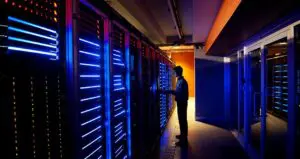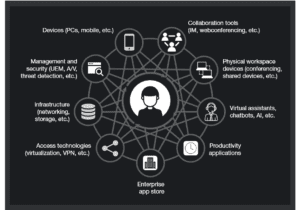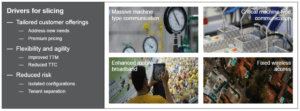Twitter Feed
SourceConnecte! Marketplace With A Mission
Earlier this year, GC GlobalNet launched a new breed of B2B e-commerce sites. Curated by Kevin L. Jackson, SourceConnecte (with an “eâ€) went live with three strategic goals in mind: Efficiently leverage modern…
Potential vs. Reality: Is Edge Computing Real?
Edge computing provides compute, storage, and networking resources close to devices generating traffic. Its benefits are based on an ability to provide new services capable of meeting stringent operational requirements…
Enabling Digital Transformation
Digital transformation integrates technology into all areas of an organization’s business or mission. Its fundamental purpose is to create and deliver innovative and industry-changing products and services to a global…
The ThinkShield Story Part 1: The Challenge
The cybersecurity challenge seems to be growing daily. Threats are becoming more sophisticated, and attacks are becoming more destructive while the corporate world’s response seems to resemble a deer…
CIO dream team: Who’s in and why?
Today’s CIO navigates the twin challenges of enabling new business models and managing rapid technological change. Cloud computing strategies are now table stakes. CIOs must make complex decisions about using…
Digital Transformation and the Mainframe
Digital transformation infuses digital technology into all areas of an organization’s business or mission. Its fundamental purpose is to create and deliver innovative and industry-changing digital products and services to…
Composable Architecture Q&A. Are you ready?
Q: Is it time for my company to jump on the composable architecture bandwagon? A: Composable architectures are quickly becoming essential to the modern enterprise. Citing a recent Forrester study:…
Increase Productivity by Reducing Technology Distraction: Lessons from Forrester Research
Workplace productivity is hurt every day by the very technology developed and purchased to improve it. Forrester announced this surprising conclusion in their latest “How To Wake Up From The Nightmare…
Unveiling the end-to-end capabilities for the networked society
An Interview with Henrik Basilier By Kevin L. Jackson The telecom industry is rapidly moving towards a future in which networks must have the capabilities of delivering services with the…
AT&T Finance Solutions GM on Shrimping, Software, and CX
Helping clients address the trends and challenges presented by the Financial Services industry is the main focus for René Dufrene in his role as General Manager of Finance Solutions at…
As a business communications tool, email is the dominant option, and many corporations have policies that allow the use of personal email on corporate computers. In a recent Adobe Systems commissioned online survey of 400 U.S. white-collar, adult workers, more than 90 percent of them admitted checking personal emails at work. The workers questioned in the poll estimated they spend 6.3 hours a day checking emails, with 3.2 hours devoted to work emails and 3.1 hours to personal messages. Nearly half of the respondents also said that their use of emails for work will increase in coming years with 19 percent saying it will go up substantially.
Employers generally have the discretion to monitor and restrict employees’ personal computer usage as they see fit and, in most cases, email messages are not subject to any personal privacy laws. But even with these stipulations, Dell SonicWall channel partner Michael Crean, President and CEO of Solutions Granted, says that allowing personal email on corporate PCs is just not worth the risk. Solutions Granted, a small veteran-owned business, is certified as a SonicWALL Managed Security Service Provider. According to Crean, the threat of malicious attacks and subsequent remediation cost far outweighs any gain from allowing personal email access. “If your employees need to check their email in the car, they use their personal phone. So why can’t they do the same at work?”
Email phishing, the attempt to acquire sensitive information for malicious reasons by masquerading as a trustworthy entity, is a significant cybersecurity threat.
“In one incident investigated by Dell SecureWorks, attackers phished an employee at a manufacturing company to obtain the login credentials for the company’s Citrix platform. The attackers were able to use the credentials to connect to internal corporate resources, then move laterally through the network and harvest intellectual property using the company’s Altris platform, which remotely distributes new software and patches to all the endpoints.”
The most sophisticated attacks are grouped in two categories:
- Indirect Phishing Attacks –attackers direct a series of emails, usually in combination with organizational information from other sources such as LinkedIn, that add up to a successful phishing campaign. An example would be an employee being tricked into giving away Yahoo credentials as part of an attack, which can give access to contact or calendar information. Another example would be an employee with a cloud-based company email (i.e. Office 365 or Gmail for Business accounts) could be successfully phished. This could give the attacker a platform for sending malicious emails that appear safe.
- Direct Phishing Attacks – Cybercriminals seek login credentials for actual business systems. During Q2 2015 security analysts found multiple examples of phishing attempts on Outlook credentials. Aside from email access, these credentials are frequently used for domain logins, providing an attacker with access to other cloud-based services, such as Dropbox or Salesforce. This sort of breech could also provide an attacker with direct access to corporate proprietary information.
Phishing is often described as spam and, according to Secure List, generally followed the same template:
- Very little text (the email generally contains a typical header consisting of several words which is exactly repeated in the body of the message)
- One or more links which load a brightly decorated picture (sometimes in parts) with all the necessary advertising data (a more detailed advertising text plus contacts: website address, phone number, company name)
- Another long link that leads to a resource that corresponds to the content of the email
- Additional ‘white noise’ text to bulk out the email
The white noise text consists of random phrases or single words in any language which may not be the same as the language of the mass mailing. This text is generally invisible to the reader of as it is written in white or pale color on a standard white background. Email is also often used to distribute malicious attachments in Microsoft Word or Excel.
Phishing is an equal opportunity threat with “Global Internet Portals”, which include email and search portals taking the brunt of the attacks. As a trusted advisor to their customers, Solutions Granted recommends the following:
- Severely restrict or eliminate employee access to personal email via company-owned assets;
- Don’t let preferences of your human resources team overrule the need for IT security; and
- Use industry proven cybersecurity technologies and best practices.
This post was written as part of the Dell Insight Partners program, which provides news and analysis about the evolving world of tech. Dell sponsored this article, but the opinions are my own and don’t necessarily represent Dell’s positions or strategies.
( Thank you. If you enjoyed this article, get free updates by email or RSS – © Copyright Kevin L. Jackson 2015)
Cloud Computing
- CPUcoin Expands CPU/GPU Power Sharing with Cudo Ventures Enterprise Network Partnership
- CPUcoin Expands CPU/GPU Power Sharing with Cudo Ventures Enterprise Network Partnership
- Route1 Announces Q2 2019 Financial Results
- CPUcoin Expands CPU/GPU Power Sharing with Cudo Ventures Enterprise Network Partnership
- ChannelAdvisor to Present at the D.A. Davidson 18th Annual Technology Conference
Cybersecurity
- Route1 Announces Q2 2019 Financial Results
- FIRST US BANCSHARES, INC. DECLARES CASH DIVIDEND
- Business Continuity Management Planning Solution Market is Expected to Grow ~ US$ 1.6 Bn by the end of 2029 - PMR
- Atos delivers Quantum-Learning-as-a-Service to Xofia to enable artificial intelligence solutions
- New Ares IoT Botnet discovered on Android OS based Set-Top Boxes












